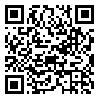Volume 17, Issue 2 (June 2019)
Iranian Rehabilitation Journal 2019, 17(2): 91-96 |
Back to browse issues page
Download citation:
BibTeX | RIS | EndNote | Medlars | ProCite | Reference Manager | RefWorks
Send citation to:



BibTeX | RIS | EndNote | Medlars | ProCite | Reference Manager | RefWorks
Send citation to:
Massah O, Rafiey H, Shariatirad S, Radfar S R, Ahounbar E, Farhoudian A. The Validity and Reliability of the Persian Version of the Leeds Dependence Questionnaire. Iranian Rehabilitation Journal 2019; 17 (2) :91-96
URL: http://irj.uswr.ac.ir/article-1-765-en.html
URL: http://irj.uswr.ac.ir/article-1-765-en.html
Omid Massah1 

 , Hassan Rafiey *2
, Hassan Rafiey *2 

 , Schwann Shariatirad3
, Schwann Shariatirad3 

 , Seyed Ramin Radfar4
, Seyed Ramin Radfar4 

 , Elaheh Ahounbar1
, Elaheh Ahounbar1 

 , Ali Farhoudian5
, Ali Farhoudian5 




 , Hassan Rafiey *2
, Hassan Rafiey *2 

 , Schwann Shariatirad3
, Schwann Shariatirad3 

 , Seyed Ramin Radfar4
, Seyed Ramin Radfar4 

 , Elaheh Ahounbar1
, Elaheh Ahounbar1 

 , Ali Farhoudian5
, Ali Farhoudian5 


1- Substance Abuse and Dependence Research Center, University of Social Welfare and Rehabilitation Sciences, Tehran, Iran.
2- Social Welfare Management Research Center, University of Social Welfare and Rehabilitation Sciences, Tehran, Iran.
3- Substance Abuse and Dependence Research Center, University of Social Welfare and Rehabilitation Sciences, Tehran, Iran; Students Research Center of International Campus, Tehran University of Medical Sciences, Tehran, Iran.
4- UCLA Integrated Substance Abuse Programs, University of California, Los Angeles, California, United States.
5- Substance Abuse and Dependence Research Center, University of Social Welfare and Rehabilitation Sciences, Tehran, Iran; Department of Psychiatry, School of Medicine, Tehran University of Medical Sciences, Tehran, Iran.
2- Social Welfare Management Research Center, University of Social Welfare and Rehabilitation Sciences, Tehran, Iran.
3- Substance Abuse and Dependence Research Center, University of Social Welfare and Rehabilitation Sciences, Tehran, Iran; Students Research Center of International Campus, Tehran University of Medical Sciences, Tehran, Iran.
4- UCLA Integrated Substance Abuse Programs, University of California, Los Angeles, California, United States.
5- Substance Abuse and Dependence Research Center, University of Social Welfare and Rehabilitation Sciences, Tehran, Iran; Department of Psychiatry, School of Medicine, Tehran University of Medical Sciences, Tehran, Iran.
Abstract: (6006 Views)
Objectives: The follow-up treatment or rehabilitation and monitoring of patients with drug abuse disorders require an efficient tool with a convenient and short-time implementation to measure psychological aspects of dependence. The Leeds Dependence Questionnaire (LDQ) has such features; thus, the present study aimed at evaluating the validity and reliability of its Persian version.
Methods: The current validation study explored the data obtained from 142 substance dependent patients selected from drug addiction treatment centers in Tehran City, Iran. The criterion-related validity of the Persian version of the LDQ was evaluated by measuring its correlation with the Substance Dependence Severity Scale (SDSS). The construct validity of the Persian version of the LDQ was evaluated using the General Health Questionnaire (GHQ). Moreover, the internal consistency and reliability of this scale were calculated by Cronbach’s alpha coefficient and test-retest reliability methods, respectively.
Results: The correlation coefficients between the LDQ and SDSS and GHQ were 0.773 and 0.780, respectively; the correlations were statistically significant (P<0.001). A Cronbach’s alpha coefficient of 0.809 was obtained by investigating the internal consistency of the tool. Test-retest reliability for a two-week interval was 0.963.
Discussion: The criterion-related validity, construct validity, internal consistency, and test-retest reliability values of the Persian version of the LDQ are approvable; therefore, it can be applied as a valid and reliable tool on the Iranian population.
Methods: The current validation study explored the data obtained from 142 substance dependent patients selected from drug addiction treatment centers in Tehran City, Iran. The criterion-related validity of the Persian version of the LDQ was evaluated by measuring its correlation with the Substance Dependence Severity Scale (SDSS). The construct validity of the Persian version of the LDQ was evaluated using the General Health Questionnaire (GHQ). Moreover, the internal consistency and reliability of this scale were calculated by Cronbach’s alpha coefficient and test-retest reliability methods, respectively.
Results: The correlation coefficients between the LDQ and SDSS and GHQ were 0.773 and 0.780, respectively; the correlations were statistically significant (P<0.001). A Cronbach’s alpha coefficient of 0.809 was obtained by investigating the internal consistency of the tool. Test-retest reliability for a two-week interval was 0.963.
Discussion: The criterion-related validity, construct validity, internal consistency, and test-retest reliability values of the Persian version of the LDQ are approvable; therefore, it can be applied as a valid and reliable tool on the Iranian population.
Article type: Original Research Articles |
Subject:
Addiction
Received: 2018/12/10 | Accepted: 2019/02/25 | Published: 2019/06/1
Received: 2018/12/10 | Accepted: 2019/02/25 | Published: 2019/06/1
Send email to the article author





